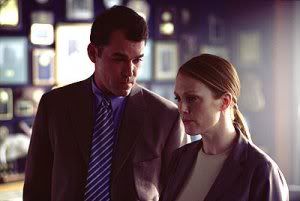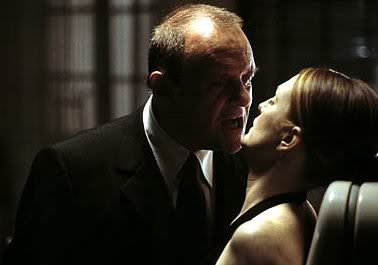
[audio:http://www.blueinkalchemy.com/uploads/hannibal.mp3]
After two truly excellent films and a somewhat passable prequel, we come to the fourth and final installment in our look at Hannibal Lecter. Like the other movies based on the novels of Thomas Harris, we’re presented with a charismatic and compelling villainous protagonist, shown dark recesses of the human condition and are at least somewhat creeped out by the goings-on. But Hannibal, to be blunt, doesn’t measure up to the truly excellent Silence of the Lambs and the very good Red Dragon. Let’s peel it apart and find out why, shall we?

At the core of any decent film should be a decent story, right? I mean, fun films can get by with gaping plot holes and one-note characters – a common criticism of most superhero flicks, even decent ones – but to make a film with something approaching meaning the story has to be solid. And while the story in Hannibal never really smacks of total implausability, every once in an while a moment comes where you feel like Thomas Harris either chuckled at the thought of skeeving his audience or dialed up a bit of lurid absurdity to underscore the fact that a novel like Silence of the Lambs adapated into a film that wins five Oscars doesn’t really need a sequel. But getting paid is nice, I guess.
So, the premise: Hannibal’s absconded to Europe and tries to get a steady job as curator at a museum. Special Agent Clarice Starling is struggling to coordinate operations but keeps getting the short end of the stick on account of having boobs. A faceless man – literally, this man has no face – is on the revenge warpath for Doctor Lecter and a Florentine police officer who has yet to notice the oddly-dressed gentleman free-running on the rooftops is beginning to suspect that his erudite, polite American is more than he seems. Seriously, when are Americans erudite and polite? There’s gotta be something up with the guy.

His leering is nowhere near as creepy as Hannibal’s default state, so Starling is completely unphased.
If there’s one thing that approaches salvaging the film, it’s Sir Anthony Hopkins. His portrayal of Hannibal remains pitch-perfect, equal parts cold menace and disarming charisma, and he’s always fun to watch. What made Silence of the Lambs so great and Red Dragon a success, however, was that he was supported by excellent material and a talented cast that kept up with him. This is not to say that Julianne Moore, Ray Liotta and Gary Oldman (face or no face) aren’t talented, but Anthony just leaves them in his dust here. I don’t think it’s the fault of the cast, honestly, nor of Ridley Scott the director. The writing is where this one falls short, and while there are glimmers of truly interesting conversation thanks to David Mamet, the big weakness that causes people to assault this film for massive damage is its focus.
In the other two films I keep raving about, the focus is on character development and interpersonal drama. They’re deeply psychological films, every bit as much explorations of the darker corners of the human mind as they are tense murder thrillers. Hannibal, on the other hand, is a gorefest. As it’s wearing the dressings of Florence and the mannerisms of Hannibal Lecter, it doesn’t have the naked self-indulgent gore of Saw or any other current horror flick you’d care to name, but it certainly likes to slice and dice its way through its running time. It takes no time to develop the new characters that are introduced other than one-note traits that verge on stereotyping, and the established characters unfortunate enough to not be Hannibal Lecter are left flat and uninteresting, mere passengers on the Cannibal Express. I say this is the writing’s fault because Julianne Moore has been in several fantastic films carrying more than her own weight, Ray Liotta was stellar in GoodFellas and Gary Oldman is one of the most talented character actors I’ve ever seen. I don’t think they were intending to play characters who are so completely flat, but that’s what they were handed.

Hannibal is considering eating her raw. …Um.
There were warning signs from the beginning that this would not end well. Both Jodie Foster and Jonathan Demme, originally foregone conclusions in the continuation of Hannibal’s story, walked away from the project due to the direction it takes and the proposed changes to Clarice’s character. The funny thing is, Ridley Scott asked Harris if he was married to his original ending, and Harris really wasn’t. In fact, the impression one gets is that Harris has little to nothing to do with this project at all. It’s unlike Silence of the Lambs and Red Dragon to such a degree that if you change the names of the characters, it doesn’t lose a thing, and neither do those other stories.
There’s an underlying cynicism to the whole affair of Hannibal that makes me wonder what Harris’ real motivation was in writing the novel. Was he prompted to do it due to Hannibal being so interesting, or did the studio hound him for another story, driven by the success of Silence of the Lambs? Whichever’s the case, the feeling one gets upon examining this odd and disappointing specimen is that it was completely unnecessary – unnecessary to write, unnecessary to make, and unnecessary to watch. Save yourself some time, and read the excellent and hysterical Hannibal in 15 Minutes by Cleolinda Jones. She even lifts lines and moments directly out of the film. Things like Gary Oldman not having a face and Starling’s disturbingly funny lines and Hannibal carefully preparing bits of brain in a saute pan. I swear, she is not making that stuff up.
Josh Loomis can’t always make it to the local megaplex, and thus must turn to alternative forms of cinematic entertainment. There might not be overpriced soda pop & over-buttered popcorn, and it’s unclear if this week’s film came in the mail or was delivered via the dark & mysterious tubes of the Internet. Only one thing is certain… IT CAME FROM NETFLIX.



Leave a Reply